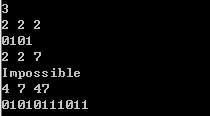Description
Consider a string set that each of them consists of {0, 1} only. All strings in the set have the same number of 0s and 1s. Write a program to find and output the K-th string according to the dictionary order. If such a string doesn’t exist, or the input is not valid, please output “Impossible”. For example, if we have two ‘0’s and two ‘1’s, we will have a set with 6 different strings, {0011, 0101, 0110, 1001, 1010, 1100}, and the 4th string is 1001.
Input
The first line of the input file contains a single integer t (1 ≤ t ≤ 10000), the number of test cases, followed by the input data for each test case.
Each test case is 3 integers separated by blank space: N, M(2 <= N + M <= 33 and N , M >= 0), K(1 <= K <= 1000000000). N stands for the number of ‘0’s, M stands for the number of ‘1’s, and K stands for the K-th of string in the set that needs to be printed as output.
Output
For each case, print exactly one line. If the string exists, please print it, otherwise print “Impossible”.
3 2 2 2 2 2 7 4 7 47
0101 Impossible 01010111011这是我的思路,为了保证0,1的个数不变,求第k个string串,关键就是如何求得最小的递增addBit()。找最小递增组合值步骤:(1)从低位向高位找第一个01XXXXX,变换成10XXXXX.因为只有这样增加,首先是保证了0,1的个数不变。(2)为了保证是最小的增量,就需要把后面的xxxxx中,高位的1与低位的0进行交换。也就是把后的值换成最小的值。然后求第K个string.递增K-1次后的串就是我们想要的串。#include<iostream> #include<string> using namespace std; #define MAXLEN 33 /*********************************************************** *功能描述:获取N个0和M个1的所有组合数 *输入:n:0的个数 m:1的个数 *返回值:组合数 ************************************************************/ long long getSum(long long n,long long m) { long long sum=1,divide=1; long long big=n+m; long long small = n; for(int i = 0;i < n; i++) { sum*=big; big--; divide*= small; small--; } return sum/divide; } /************************************************************************ *功能描述:构造N个0和M个1组合初值(即组合中最小的值) *输入:n:0的个数 m:1的个数 *返回值:组合数 *************************************************************************/ void initData(char *p,long long N,long long M) { int i=0; for(;i < M;i++) p[i] = '1'; for(;i < N+M; i++) p[i] = '0'; } /************************************************************************ *功能描述:保证0和1的个数不变的基础上,值每次递增1 *输入:data:组合数组 sum:组合位长 *返回值:组合数 *************************************************************************/ void addBit(char *p,long long sum) //递增一次 { for(int i = 0;i < sum-1; i++) { if(p[i]=='1'&&p[i+1]=='0') { p[i+1]='1'; p[i] = '0'; //将该位以后的值变成最小:低位的0与高的1进行交换 for(int j = i-1; j >= 1;j-- ) //从高位开始找最近的一个1 { if(p[j]=='1') //找到高位的一个1 { for(int k=0;k < j;k++) //从低位开始探索1个0 { if(p[k] == '0') //进行交换 { p[j] = '0'; p[k] = '1'; break; } } } } return; } } } /************************************************************************ *功能描述:显示组合结果 *输入:p:组合存放数组,sum:组合位长 *返回值:无 *************************************************************************/ void display(char *p,long long sum) { for(long long i = sum-1;i >= 0;i--) cout<<p[i]; cout<<endl; } int main() { int caseN; char data[MAXLEN]; long long all; long long N,M,K; long long value=0; cin>>caseN; while(caseN) { value = -1; cin>>N>>M>>K; all = getSum(N,M); if(K > all) //判断K值是否超过总组合数 cout<<"Impossible"<<endl; else { initData(data,N,M); for(int i = 0; i < K-1;i++) { addBit(data,N+M); } display(data,N+M); } caseN--; } return 0; }
这里实现有点浪费空间了,后面可以尝试用一个long long 型值来替代data[]数组
测试结果:























 2万+
2万+

 被折叠的 条评论
为什么被折叠?
被折叠的 条评论
为什么被折叠?








